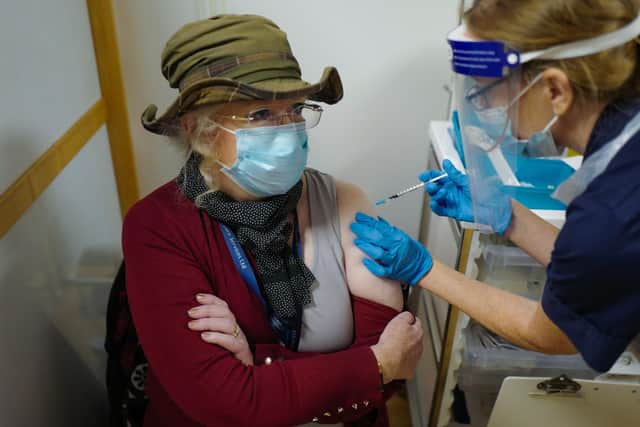People with 'significant' allergies warned not to have vaccine after NHS staff suffer reactions
and live on Freeview channel 276
The advice is that people who suffer from “significant” allergic reactions should not currently receive the Pfizer/BioNTech Covid-19 jab.
It comes after two NHS staff members who received the vaccine on the first day of the mass vaccination programme yesterday (Tuesday, December 8) suffered an allergic reaction.
Advertisement
Hide AdAdvertisement
Hide AdNHS England confirmed the news, as it is understood that both employees have a significant history of allergic reactions – to the extent where they need to carry an adrenaline auto-injector with them.


They were among thousands who received the vaccine for the first time on Tuesday.
The Medicines and Healthcare products Regulatory Agency (MHRA) has given precautionary advice to NHS trusts that anyone who has a history of “significant” allergic reactions to medicines, food or vaccines should not receive the vaccine.
The NHS in England said all trusts involved with the vaccination programme have been informed.
Advertisement
Hide AdAdvertisement
Hide AdThis means that anyone scheduled to receive the vaccine on Wednesday will be asked about their history of allergic reactions.
Professor Stephen Powis, national medical director for the NHS in England, said: “As is common with new vaccines, the MHRA have advised on a precautionary basis that people with a significant history of allergic reactions do not receive this vaccination after two people with a history of significant allergic reactions responded adversely yesterday.
“Both are recovering well.”
The MHRA advice states: “Any person with a history of a significant allergic reaction to a vaccine, medicine or food (such as previous history of anaphylactoid reaction or those who have been advised to carry an adrenaline auto-injector) should not receive the Pfizer/BioNtech vaccine.
“Resuscitation facilities should be available at all times for all vaccinations. Vaccination should only be carried out in facilities where resuscitation measures are available.”
Advertisement
Hide AdAdvertisement
Hide AdThey developed symptoms of “anaphylactoid reaction” shortly after receiving the vaccine, but both recovered after the appropriate treatment.
Pfizer said the vaccine was “well tolerated” during the trials with “no serious safety concerns”.
A spokeswoman commented: “As a precautionary measure, the MHRA has issued temporary guidance to the NHS while it conducts an investigation in order to fully understand each case and its causes.”